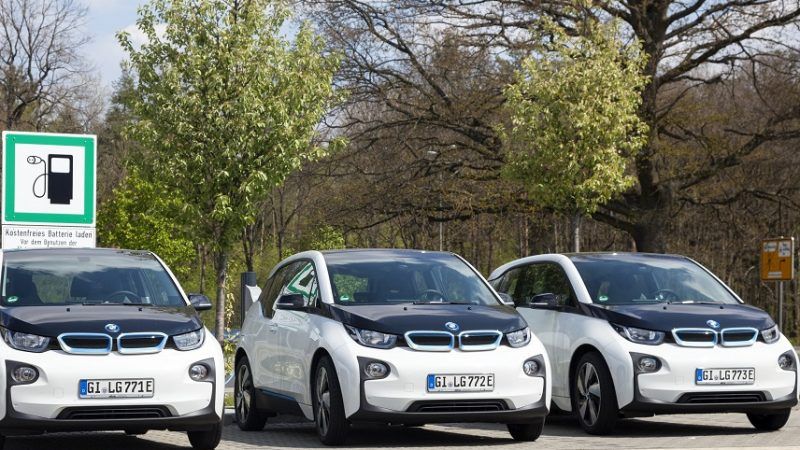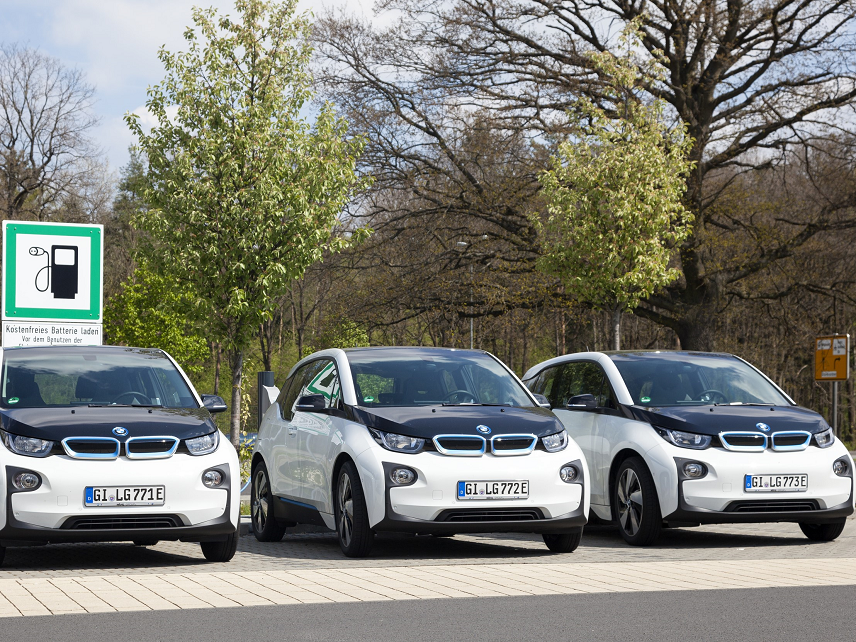Final GOP Tax Bill Retains Tax Credits for Wind Energy, Electric Cars
Some subsidies never die.


It's hard as hell to get rid of a government handout once it's been established. The beneficiaries, concentrated and organized, will fight tooth and nail to keep any program that lines their pockets. The mass of taxpayers, by contrast, have little incentive to go to war over a few dollars off their paycheck.
Consider the congressional Republicans' tax bill. The final version of the legislation retains tax credit programs for electric car buyers and renewable energy producers.
This is a dramatic change from the first version of the law—the House's Tax Cuts and Jobs Act, introduced in early November. That would have zeroed out both the Plug-In Electric Vehicle Tax Credit and a tax credit program for renewable energy production that is used mostly by wind farm owners.
Unsurprisingly, interest groups are cheering the preservation of the programs. "This credit supports innovation and job creation while helping drivers access advanced vehicle technology," announced the Electric Drive Transportation Association. "Keeping the plug-in vehicle credit in place is the right policy for consumers and for the nation."
The tax credit is a good deal—for makers and consumers of electric cars. First established in 2010, the electric vehicle program awards a maximum $7,500 tax credit to the purchasers of full electric cars; buyers of hybrid cars get a smaller credit. The benefits of the subsidy accrue to a vanishingly small number of predominately wealthy consumers.
Only 563,710 electric vehicles have been sold in the United States as of 2016, according to a report from the International Energy Agency (IEA). Of these, slightly less than 300,000 are truly electric, the rest being plug-in hybrids. California, which hands out a $2,500 tax credit for electric car purchases in addition to the federal subsidy, has seen 83 percent of its electric car tax credits go to people with annual incomes over $100,000, according to a 2016 Berkeley study. The House estimated that repeal of the tax credit, in conjunction with the repeal of several other tax credit programs, would see federal revenues increase by $200 million by 2027.
The wind energy credit, meanwhile, costs some $3.4 billion a year. The program was initially set to expire in 1999, but it has been perpetuated and expanded since. The House had initially planned to shrink this tax subsidy and speed up its phaseout, saving about $12.4 billion by 2027.
The Senate's tax bill retained both credits, and in conference it apparently was easier to keep the money flowing than to scale it back. By concentrating benefits and distributing costs, these programs have ensured that they'll live on.
Rent Free is a weekly newsletter from Christian Britschgi on urbanism and the fight for less regulation, more housing, more property rights, and more freedom in America's cities.
Editor's Note: As of February 29, 2024, commenting privileges on reason.com posts are limited to Reason Plus subscribers. Past commenters are grandfathered in for a temporary period. Subscribe here to preserve your ability to comment. Your Reason Plus subscription also gives you an ad-free version of reason.com, along with full access to the digital edition and archives of Reason magazine. We request that comments be civil and on-topic. We do not moderate or assume any responsibility for comments, which are owned by the readers who post them. Comments do not represent the views of reason.com or Reason Foundation. We reserve the right to delete any comment and ban commenters for any reason at any time. Comments may only be edited within 5 minutes of posting. Report abuses.
Please to post comments


It's the most blatant giveaway to rich people in the tax code. And it doesn't bother Progressives one iota.
Rich progressives get the credit. Poor progressives are followers who think the rich progressives know what's best for them.
You can earn more than $15,000 each month from you home, and most special thing is much interesting that the job is to just check some websites and nothing else. Enjoy full time and money freedome, also an awesome career in you life.... ?
just click the link given belowHERE??? http://www.startonlinejob.com
What part of "Final GOP Bill" do you not understand?
You can earn more than $15,000 each month from you home, and most special thing is much interesting that the job is to just check some websites and nothing else. Enjoy full time and money freedome, also an awesome career in you life.... ?
just click the link given belowHERE??? http://www.startonlinejob.com
Who says Republicans don't care about Teh Palnet?
I'm confused by the selectivity. Why aren't you attacking the child tax credit?
You must be childless.
Child Free not childless.
This guy gets it.
"Why is this article about one topic not about a related but distinct topic instead?"
how hard would it be to actually identify the specific legislators who trade their demands for these provisions for their votes?
Maybe Elon will hand over his Rolodex...
Constitution Amendment to kill all deductions, it's the only way. As long as congress has the power to give out favors like that they will
Did they kill the Solar credit?
Aw nuts. The shell game continues.
Musk is licking his chops. I'm sure TSLA shares went up on the news.
Down $2.
Musk has repeatedly called for eliminating the EV tax credit actually
A) please provide proof.
B) No surprise as I am sure he now thinks that killing the tax credit will keep smaller players out of the game.
Musk is coming close to using up his share of the tax credit bacon, his competitors not so much. So it's not real surprising. No one said cronies don't know how to crony.
I agree these tax credits are bad and distorting.
But it really bothers me that Britschgi adopts the language of the left while describing them. These credits are not "handouts". They do not "cost" the government anything.
This language posits that the government owns all of you income and whatever they let you keep is a handout. No.
Credits are a handout - the govt is paying you for good behavior.
Deductions are not a handout.
Yup. A refundable credit is a direct subsidy.
No, credits are not handouts except in the case of "refundable" tax credits, which these are not.
Tax credits are refunds of taxes already paid. If you didn't pay any income tax, you don't get the credit.
The "refundable" credits are used for very low income people and for those, you get the credit even if you didn't end up paying any income tax.
The earned income tax credit is a refundable credit, for example.
Tax credits are refunds of taxes already paid.
In other words, money you don't have and the government does have. So one could sensibly argue that it's a hand-back if not a handout. Many or most of these cars wouldn't be bought without the credits, so they are in a real sense a handout to electric car makers.
A distinction without a difference. Both reduce one's taxes for certain behavior. One just reduces them more.
If you pay less than someone else and get the same public services, you are getting free money in every which way but dumb libertarian semantics.
So the bottom 45% of taxpayers that pay no income tax are getting free money? As in, their entire income is free money gifted to them by the government?
Of course you think that.
We need to break Big Wind!
You saying the Foundation for Alternative and Renewables Tax Shelters is smelly?
Gimme a minute. *opens large can of baked beans*
Username relevant.
It'll be smelly asshole momentarily.
Do you want the GOP labeled as monsters?
How pathetic. Team Red can't even repeal a Team Blue tax deduction.
Not a deduction, but a credit. It's a direct refund of taxes already paid.
It is not a refund. It works just like a deduction, except it's a 1:1 reduction in taxes owed when you prepare your return instead of a reduction in taxable income. And if you owe no taxes before the credit it is worthless.
The reason I said refund is because by the time most people do their return, they've already paid the taxes. If you have a credit, you get those taxes refunded to you since they were an overpayment. So I'm not sure what you think you're correcting since we are in agreement.
Winners and losers. The big winner is a nuclear subsidy.
The bill extends a $6 billion nuclear production tax credit.
The bill ends some minor fossil fuel tax breaks, including a credit for marginal wells, and the enhanced oil recovery credit. But it maintains the largest tax breaks for the oil and gas industry, such as the intangible drilling cost deduction that allows producers to recover investment costs quickly.
It would trim the wind industry's 2.3-cent-per-kilowatt hour tax credit to 1.5 cents. The solar industry's 30 percent tax credit would be unchanged.
https://tinyurl.com/ycalqcbb
They should get rid of all subsidies, but recovering investment costs more quickly is much different than per kwh handouts. Now if oil producers received, say 5 bucks a barrel as a handout it would be similar. Plus oil and nukes result in useful energy that is readily dispatchable, unlike wind and solar.
Someone isn't getting an invite to the Niskaan Institute holiday party this year. Too bad. I heard it's going to be super 'woke' this year
The Donkey's are right, R's love 'em some rich folk like Rob Reiner and Begley. How could they possibly survive w/o the extra 10 grand for their hobby car.
But all the other benefits that accrue only to a handful of wealthy people are what you people have been agitating for for decades. Culture war above all, I guess. And for some reason carbon emissions are a cultural matter.
I sell solar. In California, along with the federal tax credit (which some customers apply to lower the payment, and some keep) we can usually get financing that is cheaper than the payment to PG&E, so essentially, PG&E pays for it (in the form of a lower bill). Since the system produces electricity, they don't have to buy it anymore.
After 10 to 20 years, the loan is amortized, and the payments stop (the electricity doesn't). Since those loan payments are fixed, as the utility keeps raising rates, the savings increase even as the system ages. It's so easy.
But, sometimes I talk to customer who wants to skip the financing and pay cash for a system. Unfortunately, between the utility monopoly pricing and the government subsidies, even with a cash discount, the price is higher than it would be in a free market. Manufacturers and installers only have to beat the utility price to make sales, subsidized by the taxpayer/IRS.
I expect the price of systems to drop about 30% when the 30% tax credit ends. That will help consumers in other states with lower utility costs to be able to buy a system.
The question is, "What will interest rates be, then?" Tariffs, too, may cause higher prices. The cost of silver may be higher.
As much as I disapprove of the political manipulation of behavior, since taxation is theft, I have no problem with tax payers claiming every credit they can. They earned it.
Whose idea was it to put the popular kids in charge of technology?